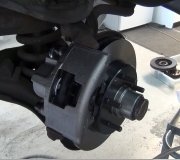We don't get involved with prices here because there are way too many variables. One national exhaust and brake chain store in our city advertises a $50.00 two-wheel brake job with a lifetime warranty on parts. Sounds like a good deal until they tell you the only way to get that warranty is to replace all the other stuff your car "needs". Even then that lifetime warranty only applies to the brake pads or shoes, not all the other parts, and you have to have the receipt or warranty card, and that warranty is only good if you have them do the next brake job and replace all additional needed parts again. Pads or shoes often cost around $20.00 so that's all the "lifetime" warranty is good for. For 20 bucks they keep you coming back for their grossly over-priced services.
When I worked for a very nice Chrysler dealership across the street, we often had people coming in for second opinions with all different brands of cars. You'd be amazed at how many of them had been given $600.00 estimates for replacing darn near every part in the brake system. We could do a legitimate, high-quality brake job on all four wheels for around $200.00.
You can't draw any conclusions as far as a locking rear brake until the hydraulic system is fixed. The brake with the leaking line and the one in the opposite corner are not working. If, for example, the right front rubber hose is leaking, only the left front and right rear brakes will be working. Both of them will be getting more hydraulic pressure than designed so easy wheel lockup can be expected.
With older rear-wheel-drive cars, if one front brake was blocked off, the car would pull real hard to the other side when the brakes were applied. That would pose a problem with the "split-diagonal" hydraulic system on your car and most other front-wheel-drive cars. Chrysler did an amazing job of redesigning the front suspension geometry back in the '80s to eliminate that pull in the event of a failure in half of the hydraulic system. The result is you are unlikely to even notice a brake problem except by the red warning light turning on. On GM cars that pulling problem has also been addressed but you might see a little wobble in the steering wheel when you apply the brakes. It isn't nearly enough to cause loss of control but it is enough to detect something abnormal. GM is the only company though that has that valve in the master cylinder to block the ports to the wheel with the leak and the one in the opposite corner. Almost all mechanics with a little experience are aware of it, and they will have to reset that valve to get the new brake line bled out, but just to be sure, when you get your car back, do a slow speed skid on gravel or sand to be sure all four wheels can lock up. If you find one front and the opposite rear wheels won't lock up, that valve isn't reseated. Many people will continue driving it like that without ever realizing there's a problem, but the brake linings that are working will wear out very quickly and those on the other two wheels will still look like new. You'll only have half of the normal stopping power. Insurance investigators love to find stuff like that after a crash, even if you weren't at fault.
Monday, November 28th, 2011 AT 11:24 PM



